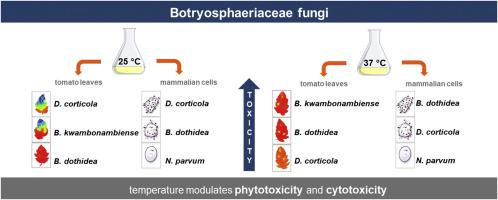当前位置:
X-MOL 学术
›
Fungal Biol.
›
论文详情
Our official English website, www.x-mol.net, welcomes your feedback! (Note: you will need to create a separate account there.)
Effect of temperature on the phytotoxicity and cytotoxicity of Botryosphaeriaceae fungi
Fungal Biology ( IF 2.5 ) Pub Date : 2020-06-01 , DOI: 10.1016/j.funbio.2020.02.012 Forough Nazar Pour 1 , Vanessa Ferreira 1 , Carina Félix 1 , João Serôdio 1 , Artur Alves 1 , Ana Sofia Duarte 1 , Ana Cristina Esteves 1
Fungal Biology ( IF 2.5 ) Pub Date : 2020-06-01 , DOI: 10.1016/j.funbio.2020.02.012 Forough Nazar Pour 1 , Vanessa Ferreira 1 , Carina Félix 1 , João Serôdio 1 , Artur Alves 1 , Ana Sofia Duarte 1 , Ana Cristina Esteves 1
Affiliation

|
Botryosphaeriaceae fungi are phytopathogens and human opportunists. The influence of temperature on the phytotoxicity and cytotoxicity of culture filtrates of five Botryosphaeriaceae species was investigated. All culture filtrates of fungi grown at 25 °C were phytotoxic: symptoms were evaluated based on visual inspection of necrosis areas and on the maximum quantum yield of photosystem II, Fv/Fm. Diplodiacorticola and Neofusicoccum kwambonambiense were the most phytotoxic, followed by Neofusicoccum parvum CAA704 and Botryosphaeria dothidea. Phytotoxicity dramatically decreased when strains were grown at 37 °C, except for B. dothidea. All strains, except N. parvum CAA366 and Neofusicoccum eucalyptorum, grown either at 25 °C or 37 °C, were toxic to mammalian cells; at 25 °C and at 37°C, D. corticola and B. dothidea were the most cytotoxic, respectively. Although the toxicity of B. dothidea to both cell lines and of N. kwambonambiense to Vero cells increased with temperature, the opposite was found for the other species tested. Our results suggest that temperature modulates the expression of toxic compounds that, in a scenario of a global increase of temperature, may contribute to new plant infections but also human infections, especially in the case of B. dothidea.
中文翻译:

温度对葡萄球菌属真菌植物毒性和细胞毒性的影响
葡萄球菌属真菌是植物病原体和人类机会主义者。研究了温度对五种葡萄球菌科物种培养滤液的植物毒性和细胞毒性的影响。在 25 °C 下生长的所有真菌培养滤液都具有植物毒性:根据对坏死区域的目视检查和光系统 II 的最大量子产率 Fv/Fm 来评估症状。Diplodiacorticola 和 Neofusicoccum kwambonambiense 的植物毒性最强,其次是 Neofusicoccum parvum CAA704 和 Botryosphaeria dothidea。当菌株在 37 °C 下生长时,植物毒性显着降低,但 B. dothidea 除外。除 N. parvum CAA366 和 Neofusicoccum eucalyptorum 外,所有菌株均在 25 °C 或 37 °C 下生长,对哺乳动物细胞有毒;在 25°C 和 37°C 下,D. corticola 和 B. dothidea 的细胞毒性最强,分别。尽管 B. dothidea 对两种细胞系和 N. kwambonambiense 对 Vero 细胞的毒性随温度增加,但在其他测试物种中发现相反。我们的结果表明,温度调节有毒化合物的表达,在全球温度升高的情况下,这些化合物可能会导致新的植物感染,但也会导致人类感染,尤其是 B. dothidea。
更新日期:2020-06-01
中文翻译:

温度对葡萄球菌属真菌植物毒性和细胞毒性的影响
葡萄球菌属真菌是植物病原体和人类机会主义者。研究了温度对五种葡萄球菌科物种培养滤液的植物毒性和细胞毒性的影响。在 25 °C 下生长的所有真菌培养滤液都具有植物毒性:根据对坏死区域的目视检查和光系统 II 的最大量子产率 Fv/Fm 来评估症状。Diplodiacorticola 和 Neofusicoccum kwambonambiense 的植物毒性最强,其次是 Neofusicoccum parvum CAA704 和 Botryosphaeria dothidea。当菌株在 37 °C 下生长时,植物毒性显着降低,但 B. dothidea 除外。除 N. parvum CAA366 和 Neofusicoccum eucalyptorum 外,所有菌株均在 25 °C 或 37 °C 下生长,对哺乳动物细胞有毒;在 25°C 和 37°C 下,D. corticola 和 B. dothidea 的细胞毒性最强,分别。尽管 B. dothidea 对两种细胞系和 N. kwambonambiense 对 Vero 细胞的毒性随温度增加,但在其他测试物种中发现相反。我们的结果表明,温度调节有毒化合物的表达,在全球温度升高的情况下,这些化合物可能会导致新的植物感染,但也会导致人类感染,尤其是 B. dothidea。


























 京公网安备 11010802027423号
京公网安备 11010802027423号